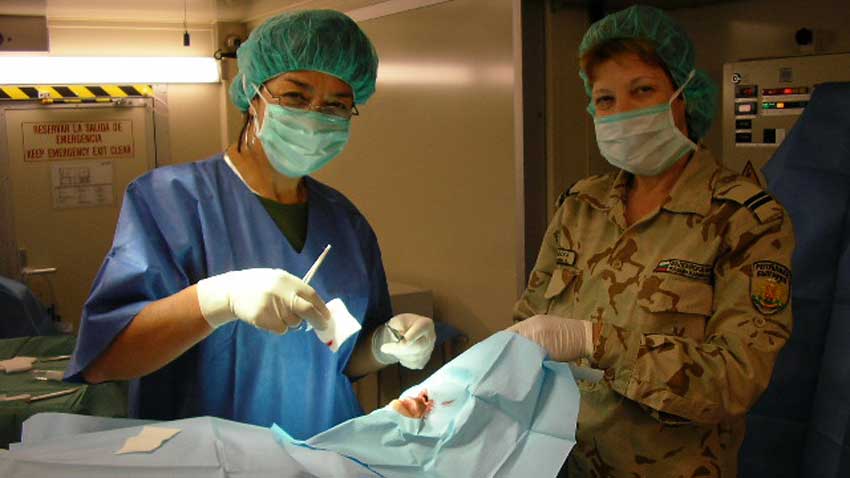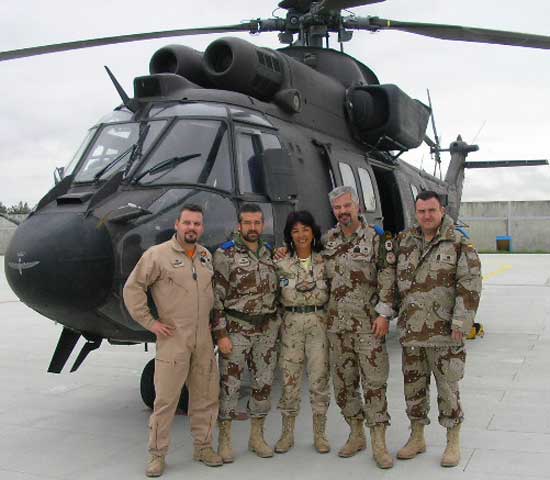“Following your heart is a wonderful thing.” With these words the first woman, head of a surgery unit during a military mission explains the choice she made when she dedicated herself to such a tough profession – abdominal surgery. Dr. Stefka Borissova spent most of her life working at the emergency centre of the Military Medical Academy. She is also a member of the wartime rapid response team.
She says there are no male professions but admits that people’s initial reaction is suspicion. “At our clinic there is a young man who is a male nurse. And there have been times when, starting out on my rounds patients have said to me: “Nurse, can you call the young doctor?” People tend to think that professions that are tough are for men,” says Dr Borissova. She adds that women can cope with any challenge, but what they need is support in raising the children. “A woman must not give up her innate role, that of a mother,” she adds. As to her decision to become a doctor:
“It was a childhood dream of mine and no one has encouraged me. My mother was in commerce. When the other girls were playing with dolls I would be bandaging the other children. Then, on my initiative, when I was in the 4th grade we set up a club “Friends of medicine” and would go and visit different hospitals. We have seen blood transfusions. We invited Prof. Dimitar Paskov, the man who invented the medicine Nivalin, to come to our school. I have always pursued my dream. When I finished school I applied for medicine, but the first time round I didn’t get enough points to be admitted. I then worked as a saleswoman but continued to study and applied one more time. I think we must all pursue our life’s dream and follow our hearts.”

When she was a student in her second year, Dr. Stefka Borissova was already taking on night shifts at the Pirogov emergency hospital. “It was at that time that I learnt to diagnose acute surgical abdomen easily,” she says. But she started out by filling out papers and administering injections. When she was in her third year she performed her first appendectomy and was assisted by a renowned surgeon. But what is the price she had to pay?
“I married while I was at university and had a child with exams coming up and it got really difficult. I graduated and 6 months later I started work at the Surgery Department at the Medical University in Pleven. My son, all dressed in green, would sit on a stool in the operating theatre – he was just over two years old then. I have always stood up for the profession but everything comes with a price.”
 In 1997 during the biggest crisis Bulgaria has been through when the hyperinflation brought monthly salaries down to 10 dollars, Dr. Borissova did her second major - military surgery. Two years later she took part in her first mission.
In 1997 during the biggest crisis Bulgaria has been through when the hyperinflation brought monthly salaries down to 10 dollars, Dr. Borissova did her second major - military surgery. Two years later she took part in her first mission.
“My first mission was humanitarian – in Macedonia in 1999 when Bulgaria set up a base for ethnic Albanians,” she says. “We treated them, fed them, took care of everything. And as there was no hospital, I had to give them surgical examinations, diagnose them and send them to a refugee hospital that was some 50 kilometers away. To begin with I thought I wouldn’t be allowed to give them check-ups because I am a woman. But there would be men lining up all the time. War is a terrible thing, but I have no fears. Fortune favours the brave. Fear is something that grabs and paralyses you.”
Besides in Macedonia, Dr. Borissova has taken part in four missions in Afghanistan. She has worked in Kabul but also at the Spanish field hospital in Herat. “It was really intense there with wounded people brought in from all parts of Afghanistan,” the brave doctor remembers.
English version: Milena Daynova
Photos: private library
The total wealth of Bulgarians has not reached over 1 trillion Leva, indicates a recent survey by the Expert Club of Economics and Politics. This is almost five times the size of the country’s gross domestic product, analysts calculate. In the space..
The Festival of Ancient Heritage "Eagle on the Danube" will carry out its most ambitious edition so far – “The Legions of Moesia”. It will be held from June 13 to 15 at three ancient fortresses on the territory of Pleven district. These are Storgosia..
By decision of the Council of Ministers, the deadline for the implementation of the activities under the National Programme for Polar Studies “From Pole to Pole” 2022-2025" has been extended until the end of 2027, BTA reported. According to the..
Employment in the services sector is increasing, while demand for labor in sectors such as agriculture and industry is decreasing. Data from the National..
Bulgaria is constantly changing, say the founders of the Bulgaria Wants You initiative. For the past five years, they have been holding motivational..
The official opening of the 2025 Harvest Campaign will take place at 10am in the "Agro – Tsar Petrov" farm in the Vidin region. BTA reports that the host..

+359 2 9336 661
